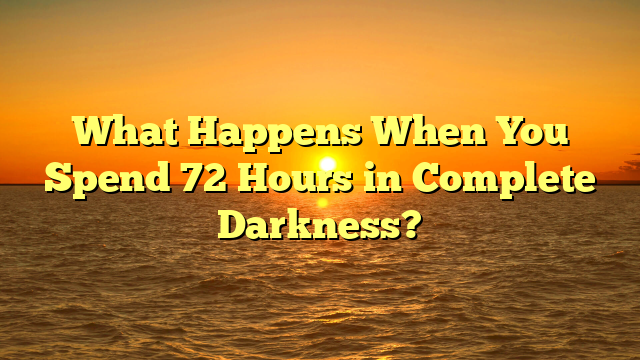## 72 Hours in the Abyss: Exploring the Effects of Complete Darkness
Imagine a world devoid of light, a sensory deprivation chamber where the only constant is the impenetrable blackness pressing in from all sides. For most of us, this is a scenario confined to science fiction, yet controlled experiments and anecdotal evidence reveal fascinating insights into the human experience of prolonged complete darkness. Spending 72 hours—three full days—in absolute darkness is a profound undertaking, profoundly altering our perception, physiology, and mental state. This article delves into the remarkable consequences of such an extreme sensory deprivation.
### The Initial Descent: Sensory Overload and Disorientation
The first few hours in complete darkness are often characterized by a jarring sensory overload. Our visual system, accustomed to constant stimulation, struggles to adapt. While initially, you might experience a sense of nothingness – a void – your other senses quickly become hyper-sensitive. Sounds become amplified, subtly altered, and potentially unsettling. The faintest creak or rustle takes on disproportionate significance. The sense of touch is heightened; every slight breeze, the weight of a blanket, or the texture of your surroundings becomes incredibly noticeable. Even the subtle pressure of your own body against the surface you’re resting on becomes amplified. This heightened awareness, coupled with the lack of visual input, can lead to disorientation and anxiety. The brain, starved of its usual visual cues, struggles to orient itself in space and time. This initial phase is often the most challenging, a stark reminder of our reliance on sight for navigating the world.
### The Circadian Rhythm’s Rebellion: Sleep, Melatonin, and Cortisol
Our internal biological clock, the circadian rhythm, is deeply intertwined with light exposure. Complete darkness throws this delicate mechanism into disarray. The suppression of light signals disrupts melatonin production, the hormone responsible for regulating sleep. While initially, the lack of visual cues might lead to increased drowsiness, consistent and uninterrupted darkness can eventually result in sleep disturbances, including insomnia and fragmented sleep patterns. Furthermore, the absence of sunlight also affects cortisol levels, the “stress hormone.” While cortisol levels naturally fluctuate throughout the day, with complete darkness, this rhythm can become erratic, contributing to feelings of fatigue, stress, and anxiety. This hormonal imbalance significantly impacts mood and overall well-being.
### Psychological Effects: Hallucinations, Delusions, and Altered Perception
As the hours stretch into days, the psychological effects of complete darkness become increasingly pronounced. Sensory deprivation can lead to a range of perceptual disturbances, including hallucinations and illusions. These aren’t necessarily vivid, fantastical visions, but more often subtle distortions of perception—phantom sounds, fleeting visual sensations, or distortions of tactile input. The lack of external stimuli can also trigger feelings of isolation, loneliness, and even paranoia. The mind, deprived of its usual anchors to reality, starts to create its own. Some individuals report experiencing altered states of consciousness, feeling disconnected from their physical body, and experiencing a distorted sense of time. These effects vary greatly depending on individual predisposition and psychological resilience.
### The Body’s Response: Physical Changes and Sensory Adaptation
Beyond the mental effects, prolonged darkness also triggers physical changes. Our bodies adjust to the absence of light in various ways. Pupil dilation becomes constant, maximizing light sensitivity within the eye. However, the lack of light also impacts Vitamin D production, leading to potential deficiencies if the darkness persists for extended periods. The body’s temperature regulation might also be subtly affected, although the exact nature of this influence is still under investigation. Some studies suggest that prolonged darkness can lead to minor physiological changes, highlighting the profound interconnectedness between light exposure and overall physical health.
### Emerging from the Darkness: Recovery and Long-Term Implications
Upon re-exposure to light, the transition can be both exhilarating and challenging. Eyes initially struggle to adjust to the brightness, experiencing a degree of photophobia – light sensitivity. The re-integration back into a visually stimulating environment can feel overwhelming, even disorienting after such a prolonged period of sensory deprivation. The psychological effects can also linger, with individuals reporting altered perceptions of reality, continuing difficulties with sleep regulation, or prolonged emotional shifts. The long-term impact of complete darkness experiences is still an area of ongoing research, but it is evident that such extreme sensory deprivation can leave a lasting imprint on both the mind and the body.
### Conclusion: The Power of Light and the Human Spirit
Spending 72 hours in complete darkness is an extreme experiment, revealing the extraordinary adaptability and resilience of the human mind and body. While the experience can be challenging, even traumatic for some, it offers a fascinating glimpse into our dependence on light, the complexity of our sensory perception, and the remarkable ability of our internal systems to respond to and adapt to radical changes in our environment. The study of such extreme experiences offers invaluable insights into the human condition and our inherent relationship with the natural world, reminding us of the profound power of light and the remarkable strength of the human spirit.

